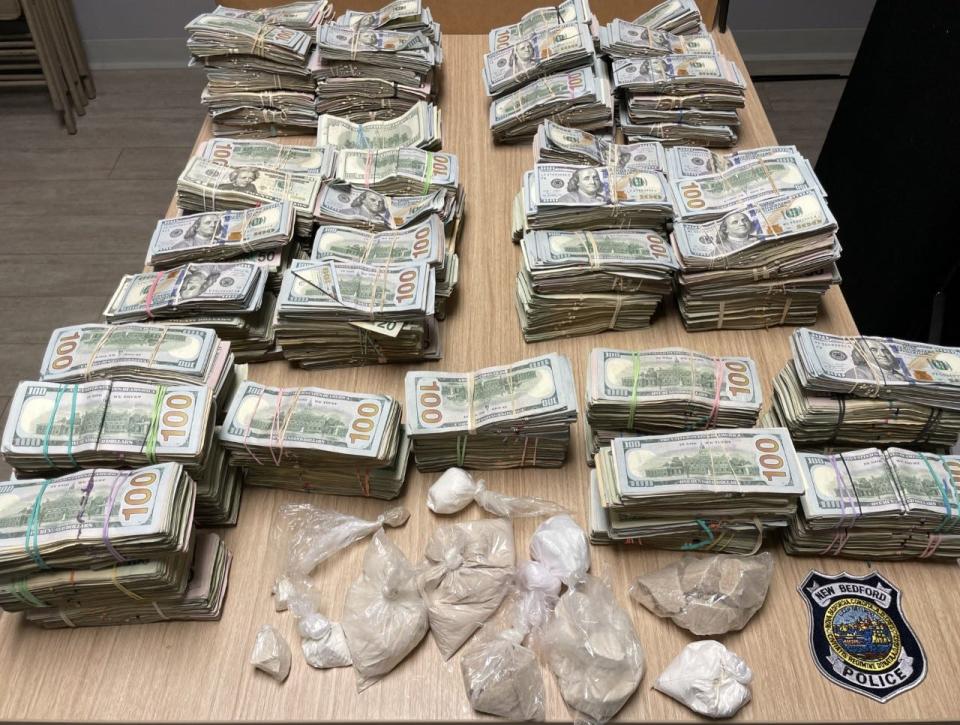What happens with drug money seized in Massachusetts. Here's what we found out.
NEW BEDFORD — The New Bedford Police Dept. seized a record $1,295,274 from two drug traffickers in 2022, the largest seizure of drug money in the department’s history.
But whether it's $1,295,274 or $250, the rules are the same for how illegal drug money can be seized and used.
The state's drug forfeiture law - Forfeiture under the Controlled Substances Act - was adopted in 1971.
What's the process to seize drugs in Massachusetts
The Mass Trial Court states that the cash seizure usually occurs upon arrest.
The money seized by police goes to the District Attorney's Office, which is charged with filing the criminal charges in District Court.
Under the civil asset forfeiture system, the prosecutor can also file a forfeiture case in the civil court system, usually Superior Court.
The prosecutor is required to provide notice to the owner or other person having an interest. The action may be dismissed for failure to give notice.

A preliminary hearing is required not less than two weeks after notice.
Some critical of process in Massachusetts
The state must show probable cause that the money was used in a drug deal.
That's a low standard of proof, according to the Institute for Justice, a nonprofit, public interest law firm, vs. the rest of the nation. All other states require a higher standard of proof, including "beyond a reasonable doubt."
Once the forfeiture is filed, it's the owner's burden to prove the money's not subject to forfeiture.
The Institute for Justice is also critical of making it the owner's burden to prove the money's not subject to forfeiture, though that is also the practice in 28 other states, as well as in federal cases.
The property owner can request a stay pending resolution of the criminal case.
The parties may also reach an agreement to settle during the pendency of the forfeiture case or forfeiture may be ordered on motion or agreement in the related criminal case.
The court's final order can distribute the money 50-50
The court's final order can provide that the money involved in an illegal drug sale be distributed fifty-fifty between the DA and the police department involved.
If other police departments are involved in the case, the court overseeing the forfeiture case can order the 50% share distributed equally among them.
What's it mean in Bristol County
The fifty-fifty split between the DA's Office and the police department involved comes after the judge's final order, said Gregg Miliote, Bristol County DA director of communications.
"If the police execute a search warrant, or they make an arrest for drug dealing or drug trafficking and there's money involved they'll seize that money," he said.
The money is basically held in escrow until the issue is settled.
As the criminal case moves forward, there can be the parallel civil forfeiture case going forward.
The money is actually a civil matter, Miliote said.
Money is often forfeited by agreement
In many of the cases, as long as there's a conviction, and as long as there's evidence tied to the money, it's usually forfeited by agreement through the defense attorney and prosecutor, he said.
If there is no agreement, it can be decided by the civil court judge.
"The civil forfeiture matter goes either by agreement or before a judge and then a decision is made whether the money can be forfeited if it is indeed profit from drug dealing," Miliote said.
How the money can, can't be used
The money can be used by prosecutors in other investigations, as well as community-based programs.
The law says up to 10% can be used for drug rehabilitation, drug education and other anti-drug or neighborhood crime watch programs that further law enforcement purposes.
Miliote said the Bristol County DA's Office has put seized money into various programs, including for at-risk youth, elder-abuse prevention, immigrant assistance, and prisoner re-entry programs.
The money is also spent on law enforcement purposes, including investigations, expert witnesses, anything that's law enforcement related.
The DAs have to submit a report to the state every year reporting how the money was spent, he said.
It can't be spent for rent.
The law states police can use the money to defray the costs of protracted investigations, to provide additional technical equipment or expertise, to provide matching funds to obtain federal grants, or to accomplish such other law enforcement purposes as the police chief deems appropriate.
That doesn't include salaries or the department's operating needs.
This article originally appeared on Standard-Times: What's the process to seize drug money in Massachusetts

